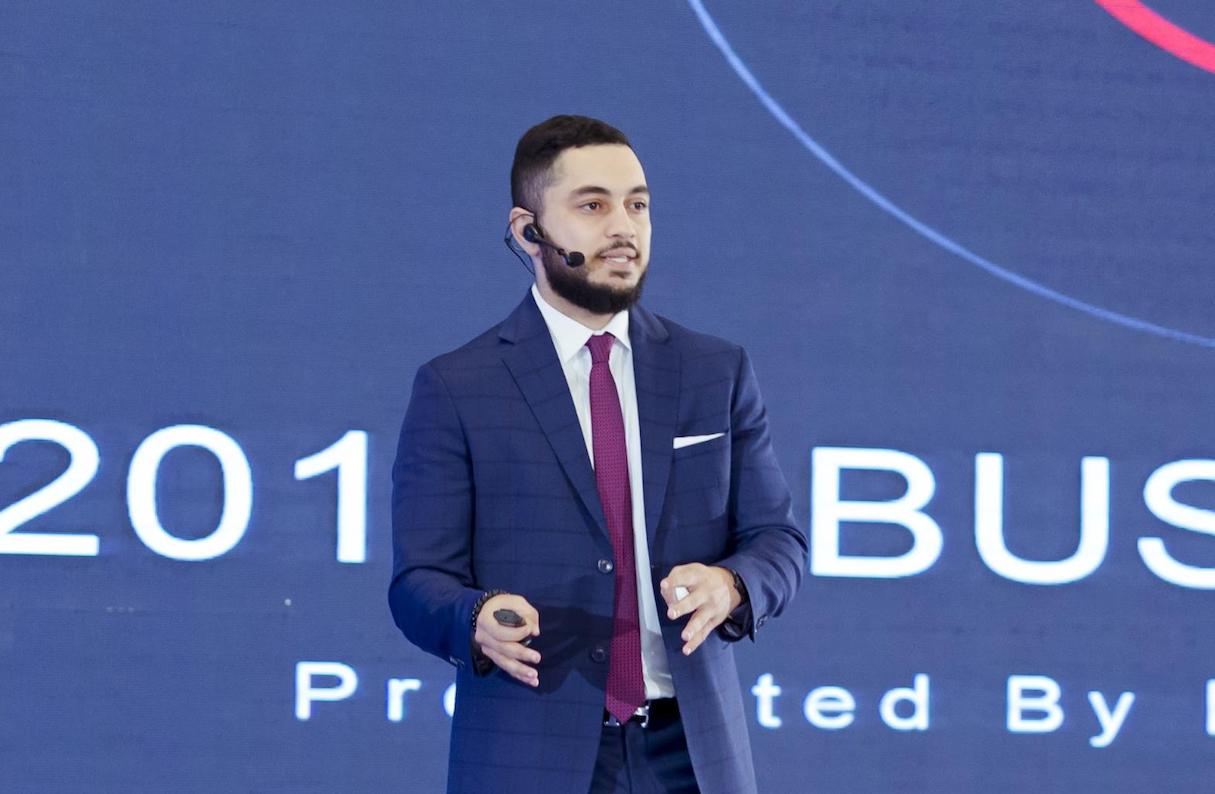Every day after his middle school bell rang to signal the end of the day, Mohamed Ali Aguel would head straight to his town’s internet cafe. There, like any other fifteen year old, he started chatting with people online and making friends around the world. But, unlike many fifteen year olds, Mohamed realized something early—he could make money online.
“Back home in Tunisia, it’s hustle life,” says Mohamed. “You have to hustle to make it.”
Today, Mohamed is a successful digital marketer and instructor. He owns multiple online stores, advises North American, European, and Middle Eastern digital marketing companies, and educates thousands through his Facebook community, Momentum Marketing Tribe.
We sat down with Mohamed to discuss what he’s learned about being an online educator. Read on for his incredible story, and for actionable advice on growing your own education business.
You might also like: 7 Tips to Help Cultivate Authenticity for your Affiliate Marketing Business.
From hustle to success
Mohamed’s success did not come easily. At only fifteen years old, he learned that one of the only ways to surmount the economic instability of his home country of Tunisia was to earn income online as an entrepreneur. So he got to work.
“Anything you could download and sell—digital products, ringtones—I would resell,” Mohamed says.
A few years into testing out different strategies and products to sell online, Mohamed was earning more money than his father, an established professor in Tunisia. The income gave him the kind of financial independence from his parents that many teenagers did not have. He could buy games or go out for a meal with friends, all without asking his parents for money. And when it came time to go to university, the income helped Mohamed move to Canada to study mechanical engineering.
“I wasn’t allowed to work as a foreign student coming to Canada,” Mohamed says. “My parents would send me money, but the Tunisian currency dropped so much, that I had no choice but to figure it out.”
Mohamed realized that he could lean on his passion for selling digital products to financially support himself. But now he upped the ante. Reselling had brought him success, but if he really wanted to be in control of his finances, Mohamed knew he would have to start selling his own products.
To make it happen, Mohamed switched his major to software engineering, so he could learn to build his own software solutions. A few semesters into his new studies, he built his first product—an SEO solution that ranks websites.
Now that Mohamed had his own product, he applied the skills he learned as a teenager selling products for other companies to sell his own. At first, he struggled—it took years testing out different sales and marketing strategies before he saw monetary success.
But when Mohamed found Shopify, something clicked. Having built an SEO solution, Mohamed realized that the very products he was selling could help him reach his target audiences. He put his software to work, and started experimenting on the Shopify platform.
It took a decade, but it finally paid off—Mohamed now has multiple seven-figure stores of his own.
Having reached real success through years of trial and error, Mohamed could easily have chosen to keep his attention on growing and scaling his business. But for Mohamed, that wasn’t enough—he wanted to help others.
Knowing that his extensive digital marketing experience could be of real help to thousands of beginners, he turned his attention to education, to help those starting out in the digital marketing space avoid his past mistakes.
Now, with a massive and loyal following as a digital marketing educator, Mohamed shares the lessons he’s learned about becoming a trusted, successful teacher.
You might also like: How an India-Based Web Developer Quit His Day Job and Built an Agency.
5 things Mohamed learned about being a successful educator

After deciding to pivot into the education space, Mohamed found that the online education landscape was exceedingly saturated.
“We used to hustle to find information,” Mohamed says. “Now there is an abundance of information—too much!”
Mohamed stands out in this saturated landscape by putting his students first. His students’ interests guide his content, and he encourages them to learn from his mistakes and, most importantly, one another.
Mohamed sat down with us to share five tangible ways an educator can put their students first.
You might also like: How to Grow Your Affiliate Marketing Efforts: Choosing the Right Affiliate Offers.
1. Ask your students for feedback
Mohamed emphasized the value of asking his students what they wanted to learn from his content.
“It should be all about your followers and what they want. If I did content about what I wanted, I’d just talk to myself at home. But the content is for them.”
It should be all about your followers and what they want. If I did content about what I wanted, I’d just talk to myself at home. But the content is for them.
He asks his students what subjects they are struggling with, and what they are curious to learn more about. From there, Mohamed plans his content around their answers.
“Surveying is one of the most powerful things you can do. Ask and you shall receive.”
TIP: You can gather large volumes of high quality feedback from your students by asking questions repeatedly in different locations. First, identify what channels your students use to interact with you currently. Do they ask questions in the comment section of your social media accounts, or through forums on your website? Once you’ve identified these key channels, use them to host regular formal and informal feedback sessions.
Mohamed regularly asks for informal feedback through real-time questions on Instagram Live, and in formal AMAs (Ask Mo Anythings) in his Facebook group.
2. Do not assume your students understand the basics of marketing

When Mohamed moved to Canada from Tunisia, he struggled with the language barrier. His native languages are Arabic and French, and English presented a challenge.
“People spoke English so quickly,” Mohamed says. “I used to be so confused.It was funny, frustrating, and weird.”
But the challenge taught Mohamed the importance of making his content accessible. He started to realize that learning a new language is comparable to his students learning the language of marketing.
“I liked when people used simple words and spoke slowly. So that’s what I do with my audience now. My own experience helped me understand beginners. I lived that real life. You have to be patient with people.”
Mohamed takes time in his courses and coaching sessions to explain basic marketing terms and jargon, no matter the student’s level of expertise.
“People don’t know what they don’t know. I want to help as many people as I can.”
TIP: No matter the level of expertise your content is intended for, do not assume your students know everything about your subject matter. First, review your content and identify any acronyms or marketing jargon that may seem intimidating or confusing. Second, define these terms in a concise and simple manner. Third, link out to alternative resources or build out your own foundational content that beginners can refer to at any time.
Mohamed will sometimes stop in the middle of his Facebook live sessions—even intermediate level ones—to define seemingly common terms like upsell and cross-sell, to ensure his students are keeping up.
3. Build a community organically
Mohamed is primarily known for his Facebook group, Momentum Marketing Tribe, that has over 1,000 dedicated and active members. In this group, members exchange information and lessons with each other, in addition to learning from Mohamed’s content. Mohamed believes that this community learning style is more important than his own educational content.
“Through Momentum Marketing Tribe, you can connect with so many entrepreneurs,” he says. “You learn from them.”
Mohamed encourages his students to post their failures, successes, and questions directly into the group. This leads to other members engaging with the posts and, in turn, learning and teaching each other.
TIP: You too can create an active and open community where your students can learn from each other. First, decide on a platform where your students are already active, whether it’s a formal Facebook group, informal WhatsApp group, or anything in between. Second, establish group rules so all your students have the same understanding coming in.
4. Believe in the product and be honest about the process
“The hardest part about affiliate marketing ,” Mohamed explains, “is trying to find a product that you feel comfortable promoting.”
The hardest part about affiliate marketing is trying to find a product that you feel comfortable promoting.
When he first started using Shopify, Mohamed recommended the platform to his network without knowing there was a structured Shopify Affiliate Program. Now a proud Shopify Affiliate, Mohamed leans on his personal experience and success to promote the product.
“I’m promoting something that I use daily,” he says. “It’s a platform that I believe in and that I’ve used to build multiple businesses and stores. I know my students are in good hands with Shopify.”
TIP: The best way to create authentic, effective, and trustworthy content is by explaining your own personal experience using the product. First, identify what products you use that excite you and help you achieve your goals. Second, build your content around your own experience using these products, and explain how and why they help you achieve your goals. Third, set realistic expectations and success metrics for your students to follow when using this product.
For example, Mohamed sets realistic goals for his students.
“I don’t sugar coat stuff. I don’t say ‘You’re going to make money tomorrow.’ I say, ‘This is how it is, these are the challenges you are going to face. This is how you are going to overcome them. If you are not ready for the stress and the pain, then don’t do it.’”
5. Bring your personality into your content

Only a few minutes into one of Mohamed’s videos, you can see how warm and funny he is. You start to connect with him, and trust what he’s saying.
Mohamed believes that sharing his personality with his students has set him apart from other educators. Making jokes and adding humor to his work helps put his students at ease, and helps them stay engaged in the content more easily.
“My students tell me, when we think of Mo, we think of that funny guy who has a lot of value to give, and has a unique way of giving it.’”
Since his content is so unique, like-minded learners are attracted to Mohamed’s teaching style. This has lead to a tight knit community of individuals with similar sentiments, meaning that the kind of information exchange happening in Mohamed’s communities is extra powerful.
“You have to be yourself,” Mohamed says. “Your personality will attract your own tribe!”
TIP: You can create content that is engaging and true to your personality. First, ask a student or a colleague to identify what your specific teaching style is. It can be anything from making jokes to using visuals to teach your content. Second, embrace and showcase this style throughout your content and the various mediums.
For example, Mohamed would joke that he was a therapist or advice columnist to his students. In turn, his students created the hashtag #AlwaysListenToMo. Mohamed and his students now regularly use this hashtag when discussing his content.
Grow with your community
If there’s one thing Mohamed has learned, it’s that success is not a monetary value.
“Seeing people being happy and satisfied with my content is success,” Mohamed says. “Tagging me in things they find, receiving the ‘thank you’ and ‘you changed my life’ messages—that’s what success is as an educator. Seeing your students as successful.”
For years, Mohamed was motivated to learn to sell online to financially support himself through school in Tunisia and university in Canada. But today, he is motivated by his own students’ success. By being authentic to his personality and products, basing his content around his students, and listening to what his followers say, Mohammed has built a community that encourages learning and entrepreneurship. From hustling to becoming an education star, Mohamed is proof of the power of putting your students first.
Read more
- Affiliates 101: What is the Shopify Affiliate Program and How Can You Successfully Apply
- 25 Affiliate Resources You Can’t Miss
- 4 Tips to Help You Create a Profitable Affiliate Blog Post
- How to Grow Your Affiliate Marketing Efforts: Develop an Audience-First Paid Media Strategy
- 4 Affiliate Marketing Strategies to Sell More in Any Market
- 5 Content Angles That Only Affiliates Can (and Should) Create

